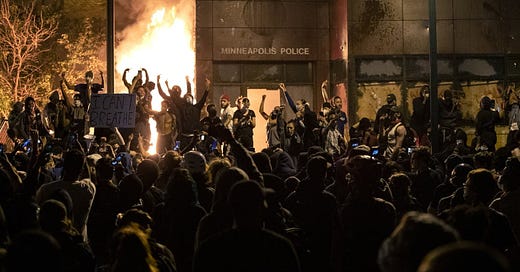In May 2020, as Minneapolis erupted in response to George Floyd’s murder by police officer Derek Chauvin, I witnessed something i never thought I’d see: the third precinct police station in flames. The message "ACAB" (all cops are bastards) and its numeric equivalent "1312" appeared everywhere - spray painted on walls, scrawled on burned-out cars, rising in chants from the crowd. That night, as militarized police shot rubber bullets and tear gas at protesters, the veneer of "protect and serve" gave way to naked force. Yet when protesters breached the precinct's defenses and flames began to consume that symbol of state violence, it wasn't just a building burning - it was the myth of policing itself.
I carry those images with me still: the dark Minneapolis sky glowing orange, the acrid smell of tear gas mixing with smoke from burning buildings, the strange solidarity among strangers passing bottles of water and warning each other about police movements. In those moments of uprising - and they were an uprising, not mere riots - we glimpsed something crucial about the nature of policing: its power depends not just on badges and guns, but on our internalization of its logic of control.
Augusto Boal, developing his Theater of the Oppressed methodology during years of exile from Brazil's military dictatorship, made a crucial observation when working in Europe. While his original techniques were developed to resist clearly visible forms of oppression - police violence, economic exploitation, political repression - he found that participants in Europe were often more constrained by internalized forms of authority. He called this phenomenon the 'cop in the head' - the way oppressive systems maintain control not just through external force but through self-regulation. This insight about internalized authority resonates deeply with my experience of gender and religious policing.
For years before I came out as trans, I patrolled my own gender expression with ruthless efficiency. Every gesture, vocal inflection, and emotional expression was scrutinized and corrected according to masculine norms I’d absorbed through years of religious conditioning. The cop in my head worked overtime to maintain proper performance of manhood, treating any deviation as a spiritual and moral failing. Like those police firing tear gas into crowds of mourners, this internal officer used fear and pain to maintain order - not through physical force but through anxiety, shame, and relentless self-surveillance.
This internalization of authority isn't accidental. Systems of power maintain themselves most effectively not through external force but by teaching us to police ourselves and each other. The genius of what Foucault called "disciplinary power" lies in its ability to make control feel natural, even virtuous. We come to believe that our anxious self-monitoring is conscience, that our harsh self-judgment is moral clarity, that our policing of others is care.
The process begins early and operates through multiple channels. Religious institutions instill a sense of perpetual moral inadequacy while positioning themselves as the source of redemption. Gender norms are enforced through subtle social rewards and punishments long before we have words to describe them. Even our most intimate relationships become sites of surveillance as we learn to perform acceptability for each other. The cop in our head doesn't arrive fully formed - it is assembled piece by piece through countless interactions, corrections, and implied threats.
My own unlearning of this internal police force has been a slow and ongoing process. Even after recognizing my transness, even after beginning transition, I still catch myself engaging in anxious self-surveillance. The difference now is that I can usually recognize these moments of harsh self-policing for what they are - the echoes of systems of control rather than authentic self-knowledge. I'm learning to distinguish between genuine ethical discernment and internalized oppression masquerading as conscience.
This internalized policing becomes especially insidious when wrapped in the language of divine authority. Christofascism doesn't simply demand external compliance - it seeks to colonize consciousness itself, making its rigid hierarchies feel natural and divinely ordained. The gender binary becomes sacred order, white supremacy becomes divine right, and capitalism becomes god's chosen economic system. Each of these requires constant internal and external enforcement.
I think about how, in my early days of gender questioning, every moment of feminine expression or desire felt not just socially dangerous but spiritually transgressive. The cop in my head carried a bible alongside its badge. Every forbidden gesture or longing triggered not just anxiety but a deep sense of cosmic wrongness. This is how disciplinary power achieves its most complete expression - by making resistance feel like sin.
Yet this machinery of control doesn't operate solely through individual psychology. It functions through networks of institutional power that position certain subjects as legitimate while rendering others questionable or deviant. We see this operating with brutal efficiency in current anti-trans legislation and rhetoric. Bills requiring citizens to report gender-nonconforming students, laws enabling medical professionals to deny care, policies demanding neighbors surveil each other's bathroom usage - all transform ordinary people into deputies of gender enforcement.
The power of institutional legitimization means that when harm is named, credibility automatically rests with those who represent "proper" order rather than those who deviate from it. A pastor's word carries more weight than their victim's testimony. A school board's concerns about "safety" override a trans student's lived experience. The machinery of credibility operates to maintain existing power relations while discrediting those who challenge them.
So how do we begin disarming the cop in our heads? How do we resist the internalized authority that makes us complicit in our own oppression and the oppression of others?
The work of disarming our internal police force requires both personal practice and collective support. For me, it began with learning to notice the voice of the cop in my head - that harsh internal narrator forever measuring me against impossible standards of gender, morality, and worth. This voice spoke with religious authority but carried all the casual cruelty of a schoolyard bully. Learning to recognize it as foreign rather than innate was my first act of resistance.
But individual awareness isn't enough. The cop in our head draws power from isolation - making us feel alone in our deviance, unique in our unworthiness. This is why mutual aid and collective care prove so essential for liberation. When we gather in spaces of authentic recognition and support, we begin to recognize how many of us carry similar wounds. The shame that felt deeply personal reveals itself as systematically produced.
I've found this particularly true in trans community spaces, where we can speak openly about our experiences of gender policing without fear of being dismissed or pathologized. In these spaces of shared vulnerability, we don't just support each other practically (though that matters enormously) - we help each other unlearn the internal scripts of self-regulation that make external control possible. Every time we affirm each other's authentic expression, we help weaken the authority of those internalized voices of control.
Yet even here we must remain vigilant. Communities of solidarity can easily mutate into new forms of conformity, developing their own internal police force. I've watched radical spaces reproduce the very dynamics of surveillance and control they were created to resist. The cop in the head is clever - it can wear revolutionary garb while still performing its essential function of regulation and control.
This is why our resistance must remain dynamic, grounded in ongoing practices of critical reflection and mutual care rather than rigid ideological conformity. We need spaces where we can be both supported and challenged, where we can practice vulnerability without sacrificing discernment. The goal isn't to eliminate all internal authority but to develop forms of ethical self-reflection that don't depend on shame, fear, and rigid control.
In the end, disarming the cop in our head is both a deeply personal and inherently collective project. Like those protesters passing water bottles through clouds of tear gas, we find our strength in networks of mutual support and shared resistance. The systems that installed these internal police forces depend on our isolation. Our liberation depends on our connection - not just to each other, but to the divine spark of possibility that lives in our deepest deviance from oppressive norms.
This is where true spiritual authority emerges - not from rigid hierarchies of control, but from our collective capacity to imagine and embody different ways of being. When we gather in authentic solidarity, we don't just resist the cop in our heads - we begin to envision and create forms of community that make such internal policing obsolete. The path isn't easy or straightforward, but it leads toward a freedom that can only be found together.








Uhm. I have no doubt that there are government infiltrations within BLM. But your information is way off. There wasn't some sort of centralized marching orders to different chapters or anything. And I know most of the leadership and organizers that were involved with BLM in Minneapolis personally or are only one step removed from them.
BLM was organized by "intelligence" agenies. They hired and bussed in a bunch of black college students to each location where the gatherings happened, which is why even the spots with tiny black populations had an OCEAN of black people show up.
It IS a problem that cops love to murder black children/black folks. BIG problem. Cops are largely white supremacist and they are not shy to admit it. True. But! The govt saw we are pissed and put together this big protest THEY could control while the really angry people got their steam out, which was intended to make us less threatening.
Lol. Fail.
Now, that's not to say one shouldn't attend these kinds of protests. Really, every dissenter should go and be a presence. Be a journalist. Take video - for one's own safety if nothing else. Talk to other non-agents about the real problems, make connections, etc. It's a free for all place where one can say and do much more than in regular public. Imagine if there ended up more of our people than of those who were HIRED or recruited by the govt organizers? That would be quite the victory.
We know what Soros is doing. We know what the Rockefellers are doing. Same with the Rothschilds, the Astors, the "Windsor" Saxe Coburg Gothas, the Orsinis, the Farnesis, etc etc etc ARE DOING.
Their days are numbered and all these hacky little Cointelpro/Chaos operations are going to go bye bye, along with their entire bloodlines.